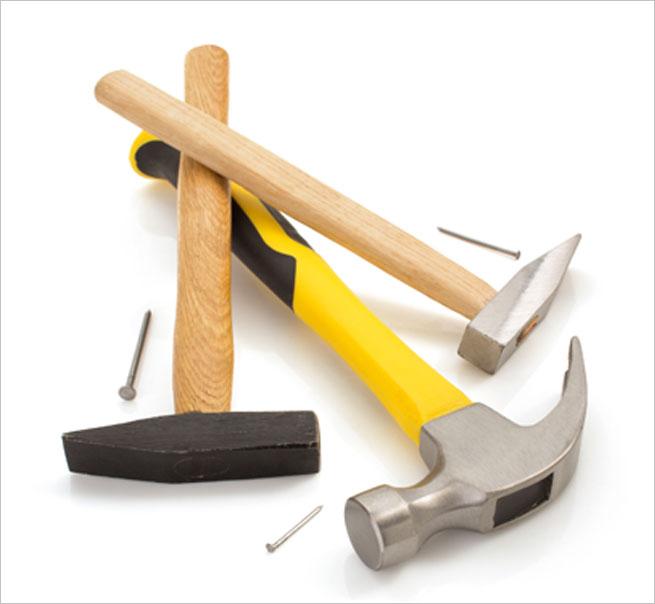Nailing It Down
When it’s fastening time, nails are the clear choice to do the job. What’s not so clear is which type to use. Our guide just might nail it down for you!
These nails are designed for roof shingles, shakes, and cladding. They are thin and feature rings on the shaft to improve holding power. They are also corrosion-resistant.
Box Nails are thinner than common nails. Due to their thickness, they are not intended for uses requiring structural strength. They are less likely to cause splits in wood and usually are available 1 to 3-1/2 inches.
Brads are smaller finishing nails ideal for paneling, frames, plywood, and cabinet work. They are generally one inch or less.
These nails are slightly larger than Brads or finishing nails providing more holding power. They are usually used for attaching window and door casings.
These nails are used for general medium to heavy construction purposes. They vary in size from 1 to 6 inches (2d to 60d).
Cut Nails feature square cut shafts that taper in width yet remain mostly constant in thickness. The square tip allows for nailing near the ends of boards without splitting.
These nails feature a cupped head that allows it to sink into plasterboard walls and ceilings. They also feature rings on the shaft to firmly secure them to drywall.
Duplex nails feature a second head (collar) close to the top head designed to prevent the nail from being driven down flush. This provides easy removal on temporary construction applications such as scaffolding.
With their small barrel-shaped heads, these nails can be driven below the surface of wood (countersinking) using a nail set. They are ideal for moulding and vary in size from 1 to 4 inches (2d to 20d).

There are different types of masonry nails – all designed to be driven into brick or concrete. Some masonry nails feature rectangular shafts. They are hardened to resist bending when they are driven into hard materials.
Featuring large round heads and heavy shafts, these nails are constructed to use on roofing products such as asphalt-based materials. They are made of aluminum or galvanized to resist rust. They are usually 3/4 to 1-3/4 inches in size.
With spiral shafts, these nails are designed for subflooring applications. They are usually made of steel and hardened to resist bending.
Annular Ring Nail
These nails are designed for roof shingles, shakes, and cladding. They are thin and feature rings on the shaft to improve holding power. They are also corrosion-resistant.
Box Nail
Box Nails are thinner than common nails. Due to their thickness, they are not intended for uses requiring structural strength. They are less likely to cause splits in wood and usually are available 1 to 3-1/2 inches.
Brad Nail
Brads are smaller finishing nails ideal for paneling, frames, plywood, and cabinet work. They are generally one inch or less.
Casing Nail
These nails are slightly larger than Brads or finishing nails providing more holding power. They are usually used for attaching window and door casings.
Common Nail
These nails are used for general medium to heavy construction purposes. They vary in size from 1 to 6 inches (2d to 60d).
Cut Nail
Cut Nails feature square cut shafts that taper in width yet remain mostly constant in thickness. The square tip allows for nailing near the ends of boards without splitting.
Drywall Nails
These nails feature a cupped head that allows it to sink into plasterboard walls and ceilings. They also feature rings on the shaft to firmly secure them to drywall.
Duplex Nail
Duplex nails feature a second head (collar) close to the top head designed to prevent the nail from being driven down flush. This provides easy removal on temporary construction applications such as scaffolding.
Finishing Nail
With their small barrel-shaped heads, these nails can be driven below the surface of wood (countersinking) using a nail set. They are ideal for moulding and vary in size from 1 to 4 inches (2d to 20d).
Masonry Nail
There are different types of masonry nails – all designed to be driven into brick or concrete. Some masonry nails feature rectangular shafts. They are hardened to resist bending when they are driven into hard materials.
Roofing Nail
Featuring large round heads and heavy shafts, these nails are constructed to use on roofing products such as asphalt-based materials. They are made of aluminum or galvanized to resist rust. They are usually 3/4 to 1-3/4 inches in size.
Spiral Flooring Nail
With spiral shafts, these nails are designed for subflooring applications. They are usually made of steel and hardened to resist bending.
